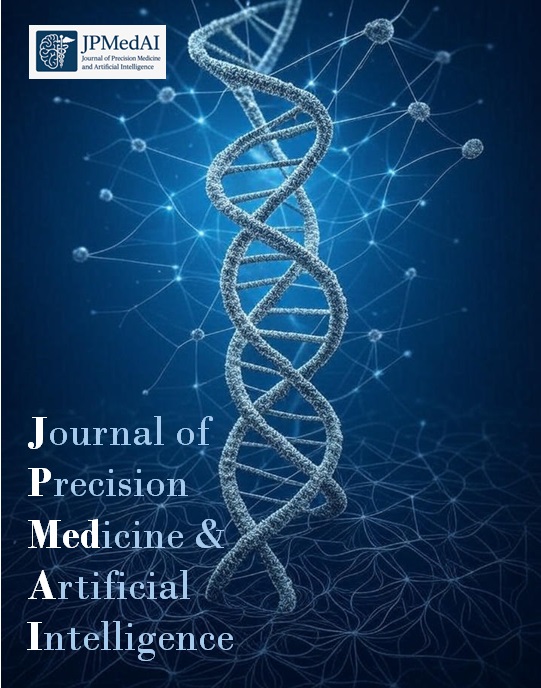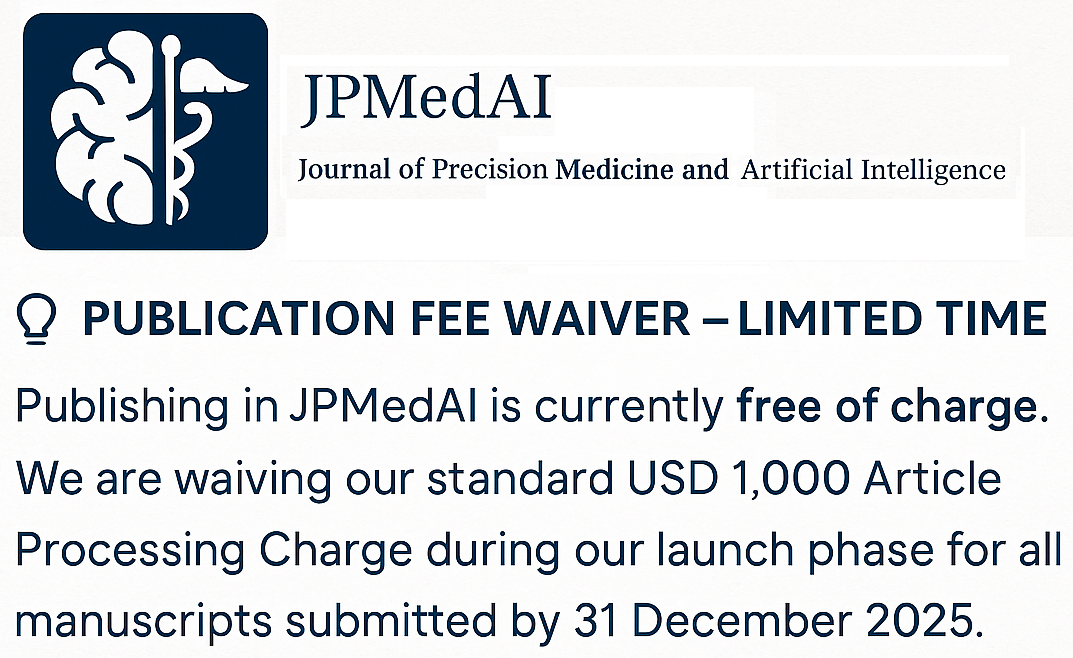
Author Guidelines
1. Manuscript Types
JPMedAI accepts the following categories:
-
Original Research Articles – Full reports of original studies (3,000–6,000 words, up to 6 figures/tables)
-
Review Articles – Comprehensive, critical assessments of the literature (4,000–8,000 words)
-
Brief Reports – Short communications and concise reports of novel findings (≤2,500 words)
-
Editorials / Perspectives – Invited or submitted opinion pieces (≤1,500 words)
-
Technical Notes / Methodology Papers – Detailed descriptions of new AI techniques or applications in medicine (≤3,000 words)
-
Case Reports – Only accepted if they demonstrate unique AI-enabled precision medicine applications
2. Submission Format
Manuscripts must be submitted via the journal’s online system in Microsoft Word or LaTeX.
Required sections for Original Research:
-
Title page (title, author names, affiliations, corresponding author email, funding, conflicts of interest)
-
Abstract (structured: Background, Methods, Results, Conclusions; max 300 words)
-
Keywords (3–6)
-
Introduction
-
Methods
-
Results
-
Discussion
-
Conclusion
-
References (Vancouver style)
-
Figure legends, tables, and supplementary materials
3. Figures & Tables
-
Figures: High-resolution (≥300 dpi), TIFF/JPEG/PNG formats
-
Tables: Editable, not embedded as images
-
Each figure/table must have a concise, descriptive legend
4. Reporting Standards
Authors must adhere to appropriate reporting guidelines:
-
CONSORT for randomised controlled trials
-
STROBE for observational studies
-
PRISMA for systematic reviews/meta-analyses
-
TRIPOD for predictive model development
-
ARRIVE for animal studies
5. Conflicts of Interest & Funding
All authors must disclose potential conflicts and funding sources in the manuscript.
6. Ethics & Consent
Manuscripts involving human or animal subjects must include an ethics approval statement and confirmation of informed consent where applicable.
7. Article Processing Charges (APCs)
Publishing in JPMedAI is currently free while we launch until 31 March 2026.
Referencing Style — Vancouver
JPMedAI uses the Vancouver referencing style in line with the ICMJE Recommendations.
-
References must be numbered consecutively in the order they appear in the text.
-
Numbers should be placed in superscript after punctuation (e.g., “…precision medicine revolution.^3”)
-
All authors should be listed if there are six or fewer; for more than six authors, list the first six followed by “et al.”
-
Journal titles should be abbreviated according to the NLM Catalog.
Examples:
Journal article
-
Topol EJ. High-performance medicine: the convergence of human and artificial intelligence. Nat Med. 2019;25(1):44-56. doi:10.1038/s41591-018-0300-7
Book
2. Goodfellow I, Bengio Y, Courville A. Deep Learning. Cambridge: MIT Press; 2016.
Book chapter
3. Esteva A, Chou K, Yeung S, et al. Deep learning-enabled medical computer vision. In: LeCun Y, Hinton G, eds. Artificial Intelligence in Healthcare. New York: Springer; 2021:55-78.
Website
4. World Health Organization. Ethics and governance of artificial intelligence for health. WHO; 2021. Accessed August 8, 2025. https://www.who.int/publications
Use of Artificial Intelligence in Journal Workflows (For Authors)
At the Journal of Precision Medicine and Artificial Intelligence (JPMedAI), we use Artificial Intelligence (AI) tools in limited ways to help manage the publishing process. These tools are used only for technical support tasks (such as formatting references, checking language, or generating XML files for indexing) and are always reviewed by human editors before publication.
Important Points for Authors
-
Editorial and peer review decisions are always made by human experts. AI is never used to accept, reject, or review manuscripts.
-
Your manuscript will not be published without human oversight. All AI-assisted edits are checked by our editorial team.
-
Your personal data are protected. We comply with GDPR and do not share sensitive author or reviewer information with external AI services.
-
If you use AI tools when preparing your manuscript, please disclose this in your cover letter and include a note in the acknowledgements section (e.g., “The authors used [tool name] for language polishing”).
This ensures transparency, aligns with international publishing standards (COPE, ICMJE, DOAJ), and helps us maintain trust with our authors, readers, and indexing services.


